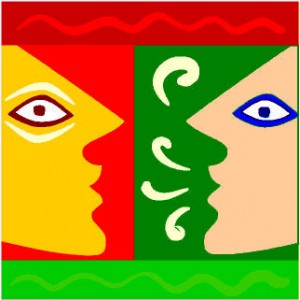Many commentators have already responded fittingly to a recently published op-ed in the New York Times by Nigerian writer Adaobi Tricia Nwaubani. (One of them was Carmen McCain in this blogpost). In “The Laureate Cause” which you can read on NY Times or on 234NEXT, Ms. Nwaubani argues a faulty logic that implies that having new authors write in local languages is detrimental to national unity and cohesiveness and thus bad for literature. To momentarily ignore the fallacy in assuming that writers write so as to further nationalistic goals rather than to justify their creative potential by creating using whatever means they have, the argument she makes insults intelligence. Language diversity is one of literature’s best assets as well as one of its most assaulted elements. It doesn’t need anymore drawbacks.
 With an array of opinions and ideologies as many as the tools of translation available to linguists, it is already difficult to prevent one work from misinterpretation. (Orwell’s Animal Farm was translated into two different ideological interpretations in East and West Germany respectively during the cold war.) However, the pleasure of being able to read works written in the native thought and tongue of the writer has aways been unquantifiable, as can be seen from the feting of writers like Gabriel Garcia Marquez, Naguib Mafouz, Gunter Grass, Mario Le Clezio and very many others including recent Mario Vargas Llosa who have all written in their local languages. If Ngugi Wa Thiong’o had won the Nobel this year, he would have been deserving of it, not just for the depth of his creativity, but for his contribution to the development of Gikuyu by choosing to write in it. We can only hope for more of those kind, and not less.
With an array of opinions and ideologies as many as the tools of translation available to linguists, it is already difficult to prevent one work from misinterpretation. (Orwell’s Animal Farm was translated into two different ideological interpretations in East and West Germany respectively during the cold war.) However, the pleasure of being able to read works written in the native thought and tongue of the writer has aways been unquantifiable, as can be seen from the feting of writers like Gabriel Garcia Marquez, Naguib Mafouz, Gunter Grass, Mario Le Clezio and very many others including recent Mario Vargas Llosa who have all written in their local languages. If Ngugi Wa Thiong’o had won the Nobel this year, he would have been deserving of it, not just for the depth of his creativity, but for his contribution to the development of Gikuyu by choosing to write in it. We can only hope for more of those kind, and not less.
Many of the books I read as a child were in Yoruba and I can’t say it enough how much it helped my appreciation of English and all the other languages I have learnt to use. If tomorrow I choose to write in Yoruba – which I have certainly considered, I would represent an important a voice in literature as someone who decides to do it in Igbo or Swahili without care for English as an international language as long as I stay committed to the craft and say something new (or even something old, in a new voice and style) and say it well. We’ll have literary translators to do the rest. To make the case for English as the only medium of creative process is easily the biggest one of the many flaws of her essay, and a disingenuous take on the African literary present and future.
Cross posted at Nigerianstalk.org.
1
Ade at http://YourWebsite
She didnt think this thru.
Posted at December 15, 2010 on 4:35pm.
2
Bukola at http://YourWebsite
Don’t know where she was going with this but it doesn’t make sense! We’re at a point as a nation and perhaps a continent where its increasingly fashionable not to speak indigenous languages yet she who is supposedly one of the “voices” of the continent makes argues as such? Like you Kola, i learnt to speak Yoruba first and my English language is the better for it – and so will my children, God help me!
As for the whole Ngugi argument: i mean, is she serious?!! Don’t reward the man’s work so people won’t copy him?! *smh*
Posted at December 15, 2010 on 5:51pm.